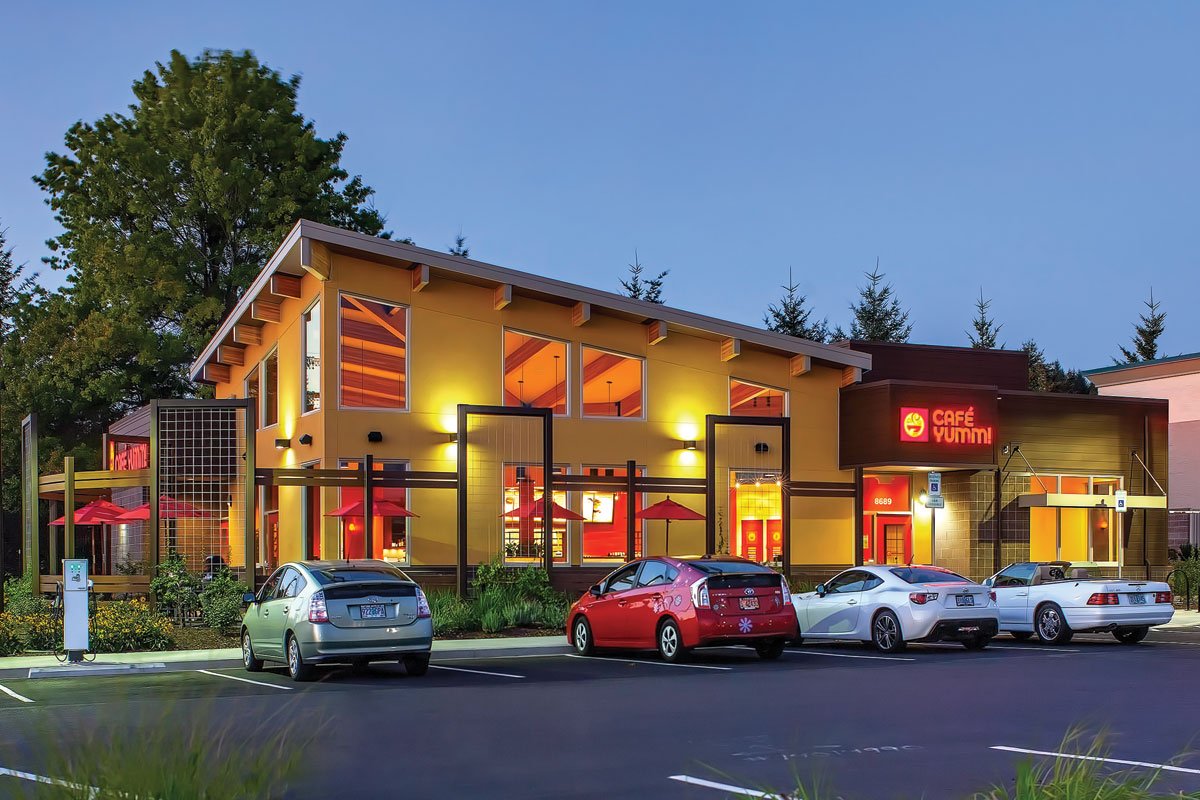Back in 2011, Café Yumm! in Eugene, Oregon, debuted the nation’s first solar-powered electric vehicle charging station, placing 172 solar panels on the restaurant’s roof to power the six charging stations.
Café Yumm! president Mark Beauchamp chuckles at the thought of earning a payback on the investment, which was $350,000.
“Not in my lifetime,” says Beauchamp, who founded the fast casual 21 years ago with his wife, Mary Ann. “In fact, I could’ve used that money to finance two new restaurants.”
But then such a decision wouldn’t align with Café Yumm!’s DNA. The 22-unit concept, one of Oregon’s first Benefit Companies, has an unrelenting focus on sustainability weaving throughout its operation, touching everything from the food on the table and the dining room décor to the kitchen appliances and the restaurant’s power supply.
Being a sustainable, eco-friendly restaurant, however, is a delicate dance. In many cases, such efforts come at a premium price with dueling missions: to be both environmentally conscious and profitable.
Assessing the ROI of sustainability
Travel back just one decade ago, and eco-friendly initiatives were largely touted as a marketplace differentiator. Quick-service brands beamed when discussing their sustainability efforts.
Yet today, such initiatives are more established in the market, a byproduct of rising consumer preferences for environmentally mindful brands as well as a flood of new technologies that have made sustainability more accessible.
But is the pursuit of sustainability worth it? The answer is that it depends. It depends on the particular initiative and the gap between the eco-friendly solution and the standard one, plus consumers’ willingness to support brands that embrace a sustainable mindset.
“All the environmental values in the world don’t work if people don’t buy into it,” Beauchamp says. “Our consumers have to value it just as we do.”
The food
Super Duper Burgers, an 11-unit, San Francisco–based concept, has forged partnerships with Straus Family Creamery, Brandt Farms, and Lamb Weston, a trio of sustainability-minded suppliers whose practices and procedures align with Super Duper’s values. Director of operations Ed Onas says Super Duper pays about 50 percent more to carry Straus’s organic soft serve as opposed to working with a generic soft-serve brand.
“We don’t always look at it as a cost issue,” Onas says. “People love what we provide and appreciate that we serve superior ingredients at a fair price.”
Café Yumm! favors minimally processed food, sourcing as much organic product as it can while also leaning on farmers from Washington, Oregon, and Idaho. Beauchamp feels his core demographic supports the additional investment, even though it’s generally more expensive.
“We could buy our beans from another country for far less than what we pay Oregon farmers, but I’m not willing to do that, and our core guests aren’t much interested in that, either,” he says. “At some point, it’s a personal judgment I have to make, and that doesn’t always match up with the ideal cost.”
The verdict: Prepare to pay a premium and to monitor the support of core customers and price sensitivity.The environment
At Larkburger, a 13-unit, Colorado-based fast casual, interior walls are clad in reclaimed Cypress from already-downed trees while dining chairs are made from 100 percent recycled materials. Such investments, Larkburger CEO Todd Coerver confirms, come at a high price.
“These decisions aren’t made in hopes of an immediate ROI,” Coerver says. “They are made as part of a bigger goal aimed at eco-friendly products becoming the new normal for all consumers and restaurants, [and] for the benefit of our environment.”
Café Yumm! units, meanwhile, feature tables of reclaimed wood, chairs crafted from sustainably harvested hardwood, and walls adorned with secondary agricultural products. Here again, these products carry a high price. The tables, for instance, require a more labor-intensive process than pulling wood from a lumber mill.
Using recycled goods, however, need not always mean greater expense. Fast casual Seoul Taco uses reclaimed items such as thrift-store boomboxes and pieces of old trucks as décor, efforts that help cut design costs in half, owner David Choi says. Similarly, restaurants might repurpose tables and chairs from shuttered eateries.
The verdict: In certain cases, a more sustainable atmosphere can be cost-effective.
The experience
From cups to cutlery, nearly every piece of packaging at Super Duper is compostable.
“There is a premium cost associated with using compostable packaging, but by creating great relationships with our vendors, we’re able to continue to provide value to our guests,” Onas says.
At Larkburger, packaging is 90 percent compostable and another 5 percent recyclable. To support that eco-friendly practice, Larkburger pays a premium for some of its packaging as well as its disposal services.
“But doing the right thing often comes with a price,” Coerver says, adding that the company, which was the first to commercially compost in the Kansas City area, hopes to someday move to 100 percent post-consumer composting and recycling.
The verdict: As with food, expect to pay a premium, but know that some efforts, such as using real glassware or silverware, could generate a positive ROI down the line.












